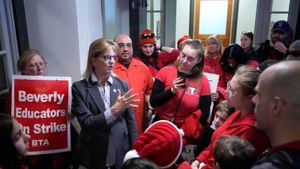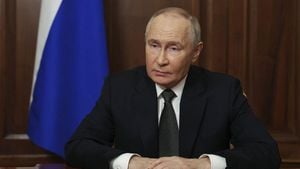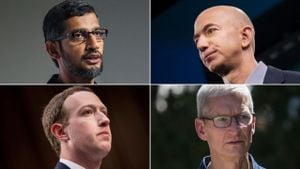Brazil is facing one of the most significant political crises of recent times, as former President Jair Bolsonaro stands accused of leading an attempted coup following his narrow defeat to Luiz_Inácio_Lula_da_Silva during the 2022 elections. The Brazilian Federal Police have documented these allegations and presented them to the Supreme Court. This investigation marks the culmination of over two years of inquiry and has not only raised questions about Bolsonaro's political future but also the stability of Brazil's democracy.
A formal announcement from the police detailed accusations against Bolsonaro and 36 other individuals, stating they had acted as part of a criminal organization aimed at maintaining Bolsonaro in power. This group is alleged to have orchestrated events culminating on January 8, 2023, when rioters stormed government buildings, attempting to overthrow the newly elected administration.
Police findings indicate they had sufficient evidence to characterize the actions taken as attempts to subvert democracy and resulted from the failure to accept the election results, something Bolsonaro never explicitly conceded. The police's comprehensive report, which extends approximately 700 pages, will now be reviewed by Prosecutor-General Paulo Gonet, who must decide whether to file charges.
During this tumultuous period, Bolsonaro has been vocal about his defense, labeling the investigations as politically motivated. He stated to the news organization Metropoles, "This is all creativity; I'm waiting for my lawyer to review the report." His assertion reflects his broader strategy of positioning himself as a victim of political persecution.
Important figures from Bolsonaro's administration are also implicated. Notable accomplices include his running mate General Walter Braga Netto and several high-ranking military officials. These revelations have sent ripples through Bolsonaro's political networks, indicating his influence may be waning. Carlos Melo, a political science professor at Insper University, remarked, "Bolsonaro is no longer the sole leader of the right-wing. His recent electoral defeats indicate a significant loss of influence".
The allegations have fueled discussions surrounding wider political ramifications. Bolsonaro's legal troubles do not end with the coup accusations. He is also facing separate investigations for smuggling undeclared jewelry and for falsifying COVID-19 vaccination records.
Bhavya Gupta, a political analyst at the Independence Institute, noted how the situation could reshape Brazil's political future, especially with increasing strife within the right-wing factions. "If the former president is convicted, it could create opportunities for new leaders to emerge within the party and redefine the political spectrum moving forward," Gupta stated.
Adding to the dizzying web of accusations, there was also news of assassination plots against Lula and other high-profile figures. Reports detailed connections to military personnel, some of whom were previously closely affiliated with Bolsonaro. This connection is particularly alarming, as it indicates the lengths to which some factions may go to challenge the newly installed government.
Public sentiment is equally polarized, with some supporters rallying behind Bolsonaro as they see him embodying their political aspirations. On the other hand, numerous Brazilians are dismayed over the potential threats to the democratic process. Instances of violence adding to this tension have surfaced, including the recent suicide bombing attempt at the Supreme Court, which was attributed to political extremism among Bolsonaro's supporters.
Legal analysts suggest the likelihood of Bolsonaro facing trial is significant, especially if Gonet chooses to proceed with the charges. Eloísa Machado de Almeida, law professor at Getulio Vargas Foundation, stated: "We can infer there is sufficient legal ground for proposing charges against Bolsonaro; it is now up to the prosecutor-general to act accordingly. ".
The political turmoil surrounding Bolsonaro has sparked speculations over his intentions for the next presidential election in 2026 — something he has remained adamant about pursuing, regardless of his mounting legal challenges. Analysts predict his current predicament could offer electoral advantages for his opposition.
Even as sympathizers back him, Bolsonaro faces increasing pressure. Local media reported calls within Congress to negotiate broad amnesty for individuals convicted of crimes associated with the January 8 riots, potentially extending this amnesty to cover Bolsonaro himself. But many experts argue this move would be politically delicate amid growing pressures against Bolsonaro’s party.
Added to this complicated mix is the suggestion by political insiders about Bolsonaro attempting to mobilize these investigations to his advantage—claiming persecution may galvanize his base. Creomar de Souza, another political analyst, cited how current developments may allow intentional distortions of narratives to benefit him or other implicated allies. "This is typical political strategy; being wronged often rallies support and can be transformational for their next steps," he commented.
Yet, as investigations continue to loom over Bolsonaro's political future, Judge Alexandre de Moraes and other key judiciary figures will also be under scrutiny, as they navigate through the considerable legal challenges Trump-style populism presents. Political dynamics have shifted, with many within Bolsonaro’s ranks positioning themselves to inherit his support base, all the more creating uncertainty about how this power struggle will resolve itself.
These events serve as clear indicators of the sensitive, fluctuative state of Brazilian politics, with Bolsonaro's legal battles now undermining whatever hold he had post-election. The country awaits the Supreme Court's next steps, which could either catapult Bolsonaro back to the political forefront or plunge him and many of his associates deep within legal troubles.
Bolsonaro’s team persists with hopes of political rehabilitation, and even though current events cast long shadows on his ambitions, the narrative he crafts about his supposed victimhood remains central to his strategy. The coming weeks will prove pivotal for the right-wing movement he once led, as they navigate uncharted territory shaped by legal and public pressures.
Overall, this saga continues to develop, and the consequences for Bolsonaro, his cohorts, and Brazil’s democratic framework will be felt for years to come. Supporting communities remain fractured, witnessing their preferred figure embroiled in severe accusations, leaving many to wonder where the political climate will settle.
For now, the world watches closely as Brazil embarks on this challenging chapter, observing how the allegations against Jair Bolsonaro may influence its political affairs and societal structure moving forward.



